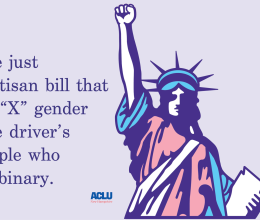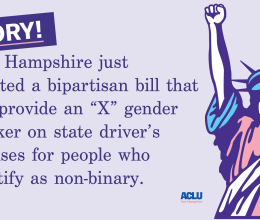Below is a column from Father Jason Wells and ACLU-NH Legal Director Gilles Bissonnette entitled "Religious Freedom Does Not Provide a License to Harm Others," and reprinted from the Concord Monitor's August 8, 2015 edition.
* * *
The struggle for marriage equality, which culminated in a momentous U.S. Supreme Court decision last June, was about chipping away at this nation’s long history of government-sanctioned discrimination against gays and lesbians. At long last, after years of litigation and advocacy by the ACLU and others, the court finally welcomed same-sex couples fully into the American family.
Some have argued that this decision was an assault on religious liberty. This is incorrect. Religious freedom is a fundamental American value enshrined in the First Amendment to our Constitution. But granting gay and lesbian couples the freedom to marry does not infringe upon anyone’s religious liberty.
As the Supreme Court explained: “It must be emphasized that religions, and those who adhere to religious doctrines, may continue to advocate with utmost, sincere conviction that, by divine precepts, same-sex marriage should not be condoned. The First Amendment ensures that religious organizations and persons are given proper protection as they seek to teach the principles that are so fulfilling and so central to their lives and faiths, and to their own deep aspirations to continue the family structure they have long revered.”
This means, for example, that houses of worship and clergy retain the freedom to determine which marriages they will and will not perform in their faith traditions. New Hampshire’s marriage equality law, passed in 2009, also recognizes this fundamental right.
The Supreme Court was correct. Religious freedom means that all of us – proponents and opponents of marriage equality alike – have the right to believe whatever we want about God and faith, and to act on our beliefs unless it harms others. Faith leaders and the ACLU have continuously fought for this right, whether by helping street preachers or defending students’ right to read the Bible during school reading periods.
However, we don’t have the right to use religion to discriminate against others and take away their legal rights. Just as religious liberty doesn’t permit a person to refuse service, deny employment, or deny housing to African-Americans or Christians, the same is true of gays, lesbians and transgender individuals.
This issue has been getting a lot of attention recently. States such as Arizona, Arkansas and Indiana have considered “religious freedom restoration” bills that would invite the use of religion to offensively discriminate against others, including on the basis of sexual orientation and gender identity.
This is wrong.
During the Jim Crow era, our country regrettably allowed African-Americans to be discriminated against in public places for decades. The civil rights movement helped our country realize that the decision to refuse service to someone because of who they are fundamentally demeans and dehumanizes that individual. And when some people claimed a right to continue to discriminate against African-Americans based on religious beliefs about segregation, the courts and the nation rightly rejected those claims. The same is true for our LGBT brothers and sisters. Like those of a different race or religious sect, these individuals deserve the right to participate equally in our society.
This is why New Hampshire, since 1998, has been among the 21 states that protect against discrimination on the basis of sexual orientation in places of public accommodation, employment and housing. (Unfortunately, New Hampshire does not protect against transgender discrimination.) Those same anti-discrimination laws also protect people from racial and religious discrimination.
There are an estimated 50,000 LGBT individuals living in New Hampshire. They are our friends, neighbors, family members and co-workers. Many are people of faith who worship in communities like Grace Episcopal Church in Concord. When it comes to being able to earn a living or being served by a business or government office, they should be treated like anyone else. Religion should not be used as a license to violate state laws designed to end the demeaning practice of discrimination in these contexts – whether it be discrimination on the basis of race, religion or sexual orientation. Period.
Sadly, LGBT citizens still aren’t protected against discrimination in the remaining 29 other states, or even under the federal 1964 Civil Rights Act. So while you cannot be discriminated against on the basis of race or religion nationwide, in over half of the United States gay and transgender people run the risk of facing discrimination every time they eat at a restaurant, shop for clothes or go to the gym. This unfortunate reality means that there is much more work to be done to ensure that LGBT Americans are treated as full citizens.
(The Rev. Jason Wells serves as pastor of Grace Episcopal Church in Concord. He also serves on the board of the American Civil Liberties Union of New Hampshire. Gilles Bissonnette is the legal director of the American Civil Liberties Union of New Hampshire.)


